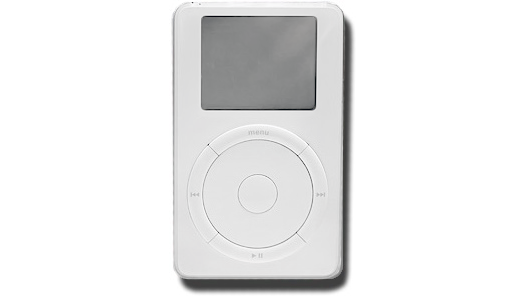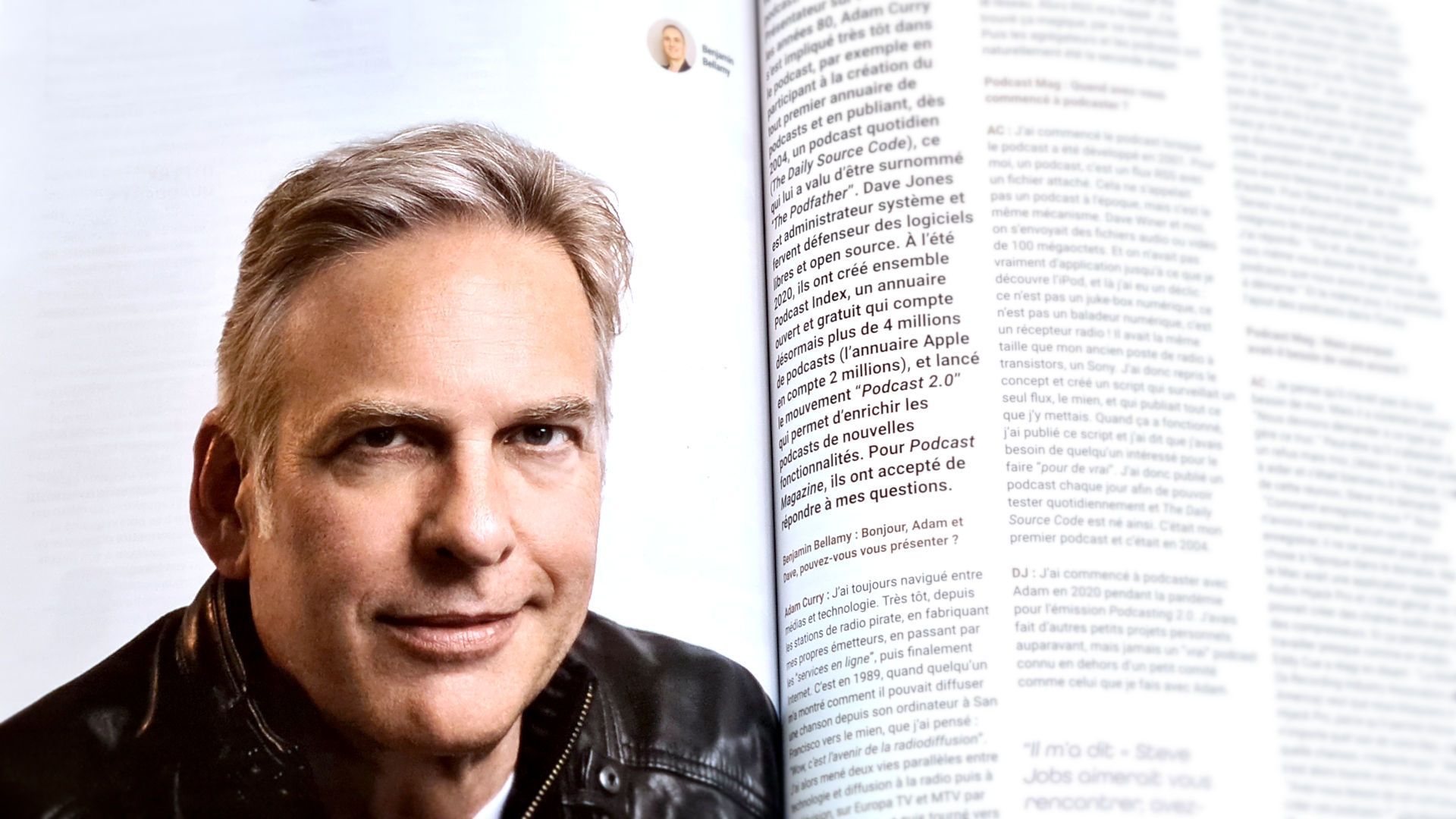
The Podfather 2.0 (The pioneers strike back)
In the summer of 2020, Adam Curry and Dave Jones co-created PodcastIndex, a free, open directory that now has more than 4 million podcasts (the Apple directory has 2 million), and launched the “Podcast 2.0” movement to add new features to podcasts. We had a little chat last month.
This interview was originally written in French for issue 2 of “Le Podcast Magazine” (1st magazine dedicated to Podcast in France).
Benjamin Bellamy: Hello Adam and Dave, could you tell us a little bit about yourselves?
Adam Curry: I have always been interested in communications and technology. From very early on, from pirate radio stations, building my own transmitters, later finding “online services”, and eventually the internet. It was probably in 1989 that someone showed me how he could stream a song from his computer in San Francisco to my computer. At that point, I thought: “Wow, this is the future of broadcasting”. So, I just ran a parallel life of technology along with broadcasting on the radio and on television, on Europa TV and MTV among others. In 1994, I left that broadcast career to find new ways to “broadcast”, and I started by building websites for big brands.
Dave Jones: I have been a system administrator for almost 30 years, and I've been fascinated with computers, especially computers that could speak with each other over networking, since I was an early teenager. And so RSS took me, it captured me. I thought it was magical just in its simplicity. So, aggregators and podcasting were a natural next step.
BB: When did you start podcasting?
AC: Well, I started podcasting when podcasting was developed in 2001. I consider a podcast to be any RSS feed that has an enclosure. It wasn't called a podcast back then, but it’s the same mechanism. Dave Winer and I were sending a hundred megabyte video files back and forth. We didn’t really have an application, and it wasn’t until I found the iPod that I realized: this is not a digital jukebox, this is not a digital Walkman, this is a radio receiver! It had the same size, the same dimension, and the same feel as an early transistor radio I had, a Sony. And so, I took the concept and built a script that would only look in one feed, mine, and it would do the function of anything I put up there. When that worked, I put that script out and I said I needed anyone who's interested to build this for real. From that point on, I created a podcast every single day in order to have something to test against, and that is how “The Daily Source Code” was born. It was 2004, and that was my first podcast.
DJ: I started podcasting with Adam in 2020 during the pandemic for the Podcasting 2.0 show. I had done some other small personal projects, but never a “real” podcast that was known outside of a niche like the one I did with Adam.
“Steve Jobs would like to meet with you, do you have any time for that?”
BB: Adam, I heard a story about you getting a phone call at the time from Steve Jobs, could you tell me that story?
AC: This was around 2005. I actually got a phone call from Eddie Cue, who runs all media at Apple. He said “Steve Jobs would like to meet with you, do you have any time for that?”. I said “Yes”, of course, and he said “Well, could you come to San Diego?”. I didn’t really know what it was about. I figured it might be about podcasting, but I wasn’t sure. And so, I had a very nice meeting with him, where we talked about a lot of different things, for about an hour. And then Steve said: “Hey, would you be okay if we put podcasting into iTunes?”. I said: “Yes, and guess what, I'll even give you the directory that we have to get you started.”. That same day, he announced podcasting in iTunes.
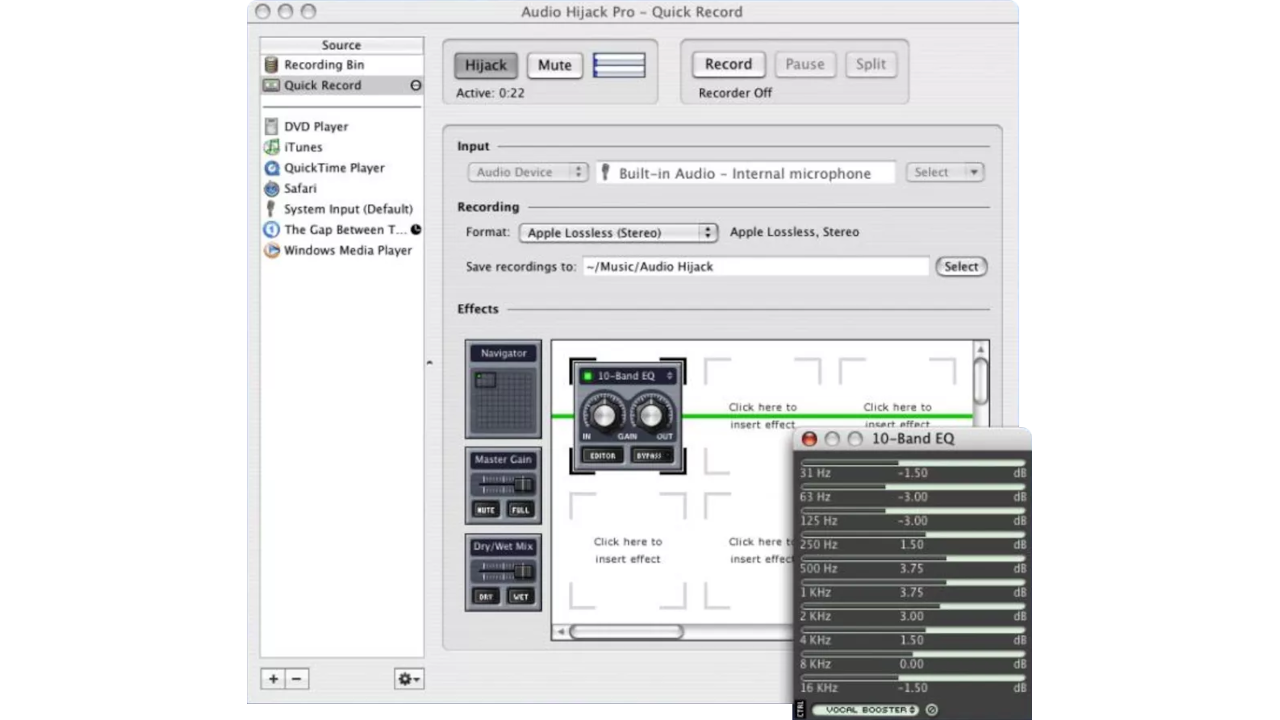
BB: But what did he need your approval for?
AC: I don’t think he needed me at all. But, surely he thought: “We probably should ask that guy who was driving this if he’d be okay with it”. Maybe he was expecting pushback, but I was delighted. He was willing to help with all kinds of things, and that was welcome at the time. And in that very meeting, Steve asked: “How do you do your recording?”. We didn’t really have any tools to record, there was not much going on at the time. But the Mac had an application called Audio Hijack Pro, and it was great because we could create audio chains with compressors, and replicate a bit of studio work. Eddie Cue said: “The RIAA wants us to disable Audio Hijack Pro, because with it you could record any sound off of your Mac, any song, anything.”. Steve then turned to me and said: “Do you need this to create these podcasts?”. I said: “Currently, yes!”. So Steve Jobs told them to get lost, and I thought: “Hey man, thanks, Steve's on my side. That's cool.”.
Edit (March 24th 2023): Paul Kafasis wrote a blog post from Rogue Amoeba's Audio Hijack's point of view here: The RIAA v. Steve Jobs
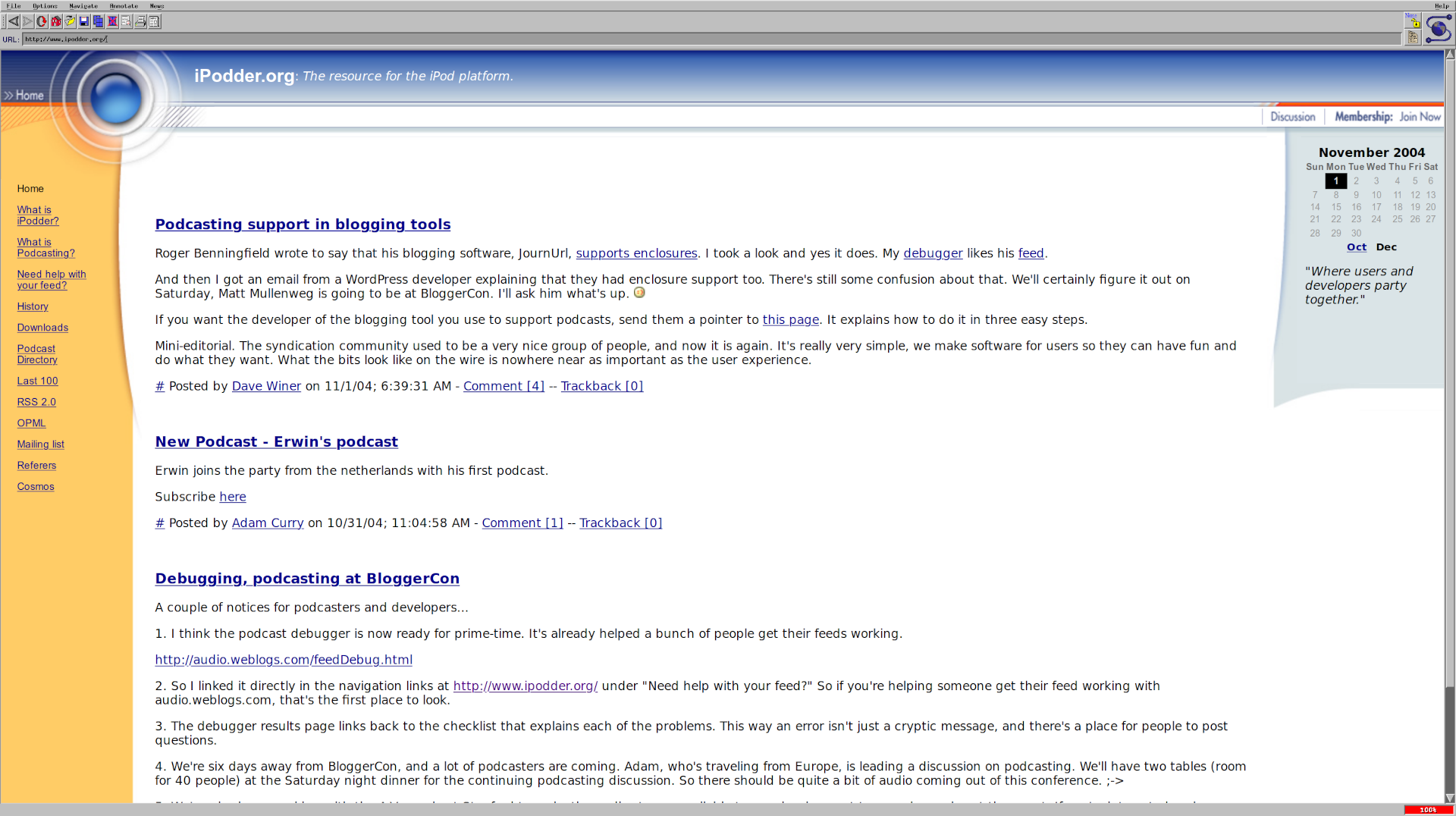
BB: But you gave him your podcast directory.
AC: Well, it wasn't really my directory. We had created something called iPodder.org. It was a website, and a beautiful use of OPML, the language that Dave Winer had codified. That was about 5,000 podcasts. I didn't realize what I was giving away at the time. I didn’t focus on it for a very long time. Until recently, when I realized that someone had some power that had to be taken away.
BB: So, is it accurate to say that the first Apple Podcasts index was yours?
AC: It was iPodder.org, which was done by a whole bunch of people, and that I maintained. But Apple put NPR, PBS, BBC – all of the public broadcasters – on the homepage to make it look legitimate. And so people who had built this medium, myself included at the time, couldn’t highlight other podcasts. I understood why they did that, and it was probably a good idea for them to do it, but it was a little disappointing from our point of view. Also, I have to give props to an unsung hero of podcasting, Tony Kahn of WGBH in Boston. He's actually the guy that brought NPR (National Public Radio) into podcasting. We loved what he was doing, it legitimized the medium.
So yes, the rest of the directory was the one that I gave them.
I am a podcaster. I create podcasts.
BB: That makes me think about a discussion we had last week. In France, we distinguish native podcasts from the podcasts that come from radio broadcasters. Do you think it would make sense to have a native podcast tag in order to separate the two of them?
AC: I don't think it's necessary. The biggest podcast I have, “The No Agenda Show”, outpaces many NPR and PBS programs in terms of the size of the audience. I don’t consider myself to be indie, I am a podcaster. I create podcasts. And I don’t think we need any additional label, because we could go on categorizing things forever… Is it commercial, non-commercial…? Me, I like that I have to compete with people who are well-funded. I like it very much in fact, because I see what I can do, what they can’t do.
There were 10 years of no development because we had this chicken and the egg problem.
BB: So how do you see the podcasting landscape now?
AC: I think that the landscape was stuck. It was really stuck. And that’s what Dave and I came in to unstick, even though it wasn't our intent initially. We both saw that Apple had put themselves in a position where they had power and they were starting to use it. They were using it with how they returned API results for example. And I adore the French, for many French people were saying: “We don’t want to be on Apple, we don’t care.”. And Christopher Isene has found thousands of French podcasts that were never even submitted to iTunes, which I think is badass. So, we felt that there should be an open index, a place where everybody can feel like they can belong, without any politics to it. Everyone should be able to access it and it's free and open-source to use for as long as we can make that work. However, the development had stopped. There were 10 years of no development because we had this chicken and the egg problem. If we wanted to do something new with podcasting, Apple had to agree. If Apple didn’t do it, it wasn’t worth trying. It was really defeatist. For 10 years, people had been creating academies and steering committees and Slack groups and it all came down to: “Oh, Apple, can you please do something?”. If you’ve ever owned a Mac or an Apple product, you know you can't get an answer from Apple on anything, let alone about changing podcasting or upgrading. So I think it was really natural for two people like Dave and me to come in and say: “Here's the technology piece, why don't we just build this and see if they come?”. And people did. So we uncorked this pent-up energy. Yourself included, Benjamin. I think that with Castopod, you had so much that you wanted to do and so many ideas to offer. We just facilitated that and lo and behold, there are developers on the other side suggesting and developing new features. We’re back where we were 18 years ago. We're running with scissors, it's dangerous. We could fall down, could poke an eye out, and that became super fun. So, in today’s landscape, I don't believe that lists and number ones matter. Being the biggest is no longer relevant. Disney's no longer number one streaming, but neither is Netflix and neither is Paramount and neither is the BBC. It’s all spread out. People are not that interested in networks, I don't think they ever have been. They like individual pieces of content and for different reasons. It's clear as day to me that lists and this discoverability through technology is a Fata Morgana. Discoverability is something that happens between people. And that's inherently what a podcast is: “How do I tell my buddy about this cool podcast?”. It's not about an algorithmic discovery mechanism like YouTube, because that just doesn’t matter to the people who are podcasting.
The index served the original purpose that Adam talked about earlier which was taking the locus of control within podcasting away from Apple and anybody else who would attempt to centralize it.
BB: A little more than two years ago, you and Dave started Podcasting 2.0 and PodcastIndex. Could you tell me what they are? Are they the same thing? If not, what is the difference between the two?
DJ: Podcasting 2.0 and PodcastIndex are not the same thing. I run the Podcast Index on a technical level. I do not run Podcasting 2.0. Podcasting 2.0 is created by developers and everything they do combined together. Adam and I talk about it every week on the show (“Podcasting 2.0”). We talk about Podcasting 2.0, we talk about the namespace, we talk about the things that are happening within the community, but we don't dictate what happens within Podcasting 2.0. Podcasting 2.0 is the convergence of everybody within the project who is willing to put in the hard work and the elbow grease to develop products and make things happen. The index served the original purpose that Adam talked about earlier which was taking the locus of control within podcasting away from Apple and anybody else who would attempt to centralize it. So, the index is a central aggregator that tries to find every podcast that exists in the world. There's no preference to any one over the other. We find and combine them all into a database, and then make that freely available for download for anybody who wants it, no monetary expense on their part. That's the main function of the index. Its secondary function is to facilitate Podcasting 2.0 and the things that happen inside the Podcasting 2.0 open-source movement. So you could say that on a technical level, PodcastIndex solves the freedom of speech and free content issue where there is no gatekeepers within. But Podcasting 2.0 serves a more open-source idea of revolution. Open-source has always been about revolution. That's its fundamental goal in the free software world. And so, we strive to be the tip of the spear for all of the things that happen within Podcasting 2.0, as far as ideas, crazy and new, and all of the things that people come and say: “Hey, I want the PodcastIndex API to give me this type of information.”. And the answer to that is always: “Yes, okay, let’s do it”. So to sum it up, PodcastIndex is not Podcasting 2.0, but the index serves Podcasting 2.0 goals and ideas.
All we want is for the technology to flourish and blossom and enable features that people want.
BB: What is the relationship between Podcasting 2.0 and the namespace?
DJ: The namespace is the heartbeat of Podcasting 2.0. It gives feet and fleshes to the ideas that Podcasting 2.0 seeks to achieve. Podcasting 2.0 is about decentralizing, returning the idea of free and open-source. The podcast industrial complex could be sum up as all the big players within the advertising centric model of podcasting that had grown up over the last decade. Podcasting 2.0 serves to take that back. So, the namespace is all of the ideas that people want to see in podcasting, but couldn't happen because they didn't fit the financial motivation of the podcast industrial complex. All we want is for the technology to flourish and blossom and enable features that people want. It doesn't matter if it doesn't bring anybody a dime or a dollar. All that matters is that this thing is wanted and it needs to exist. So let's make that happen in the namespace. Once we put a feature in the namespace, then it can exist in the RSS feed of the podcast. And that’s it. It's done. We don't need an organization to approve it. It's just done based on the will of the people involved.
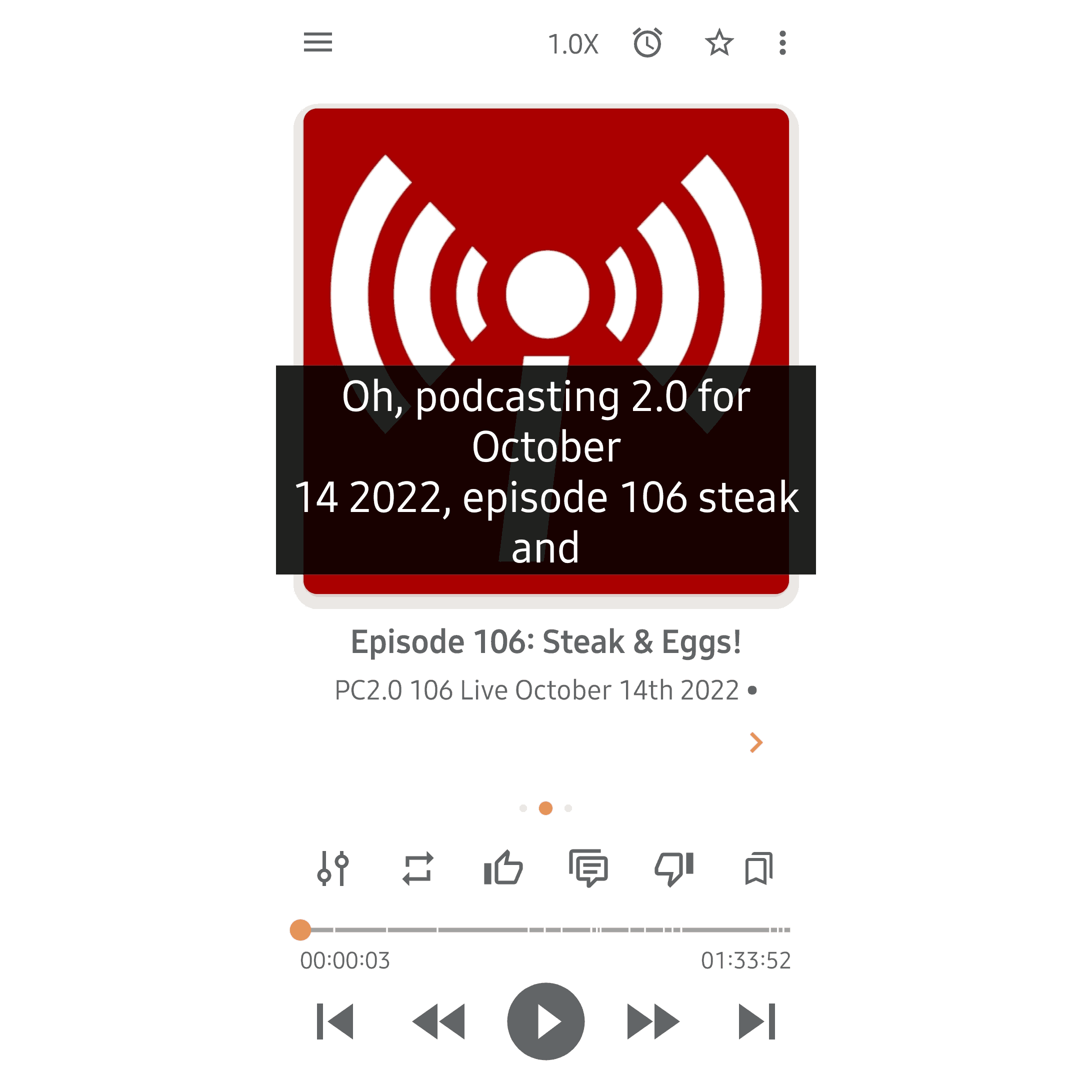
BB: Could you list a few added features that were not available before?
DJ: Transcripts, which are a huge feature for accessibility. It’s pretty obvious. You need closed captioning for accessibility reasons. The namespace defines a way for transcripts to exist for episodes in the podcast’s RSS feed. You could do dynamic transcripts, like on the fly transcribing, within the app itself. Some applications do that. But the namespace allows podcasters to transcribe their own show and be very careful and deliberate. Let's say that it's a medical podcast and the terminology is really important to get it right. The namespace allows the podcaster to curate exactly what they want that transcript to look like, and then deliver it with the episode so that podcast players can just read the transcript and display it in real time. That's one feature. Cloud-based chapters are another. They allow you to deliver dynamic chapter content that changes even after the episode is published. Another one is the ability to do a live broadcast. It's always been possible, but it's never been defined in the RSS feed of the podcast itself. So you would have to go to some external information source, like Twitter or something like that, to find out when the show was going to be live. Now with the podcast namespace, we can deliver that information and even the audio stream itself directly inside the RSS feed. There are about 20 features in the namespace currently. Those are just three examples and they're all of that same flavor.
BB: How much does it cost?
DJ: Podcasting 2.0 doesn't cost anything to anyone. Podcasting 2.0 is just an open standard. The namespace that is freely available to anybody. So, any podcast host or podcast app or podcast service can just look at the standard, read the documentation, develop their product to fit the standard, and get all the benefit for free.
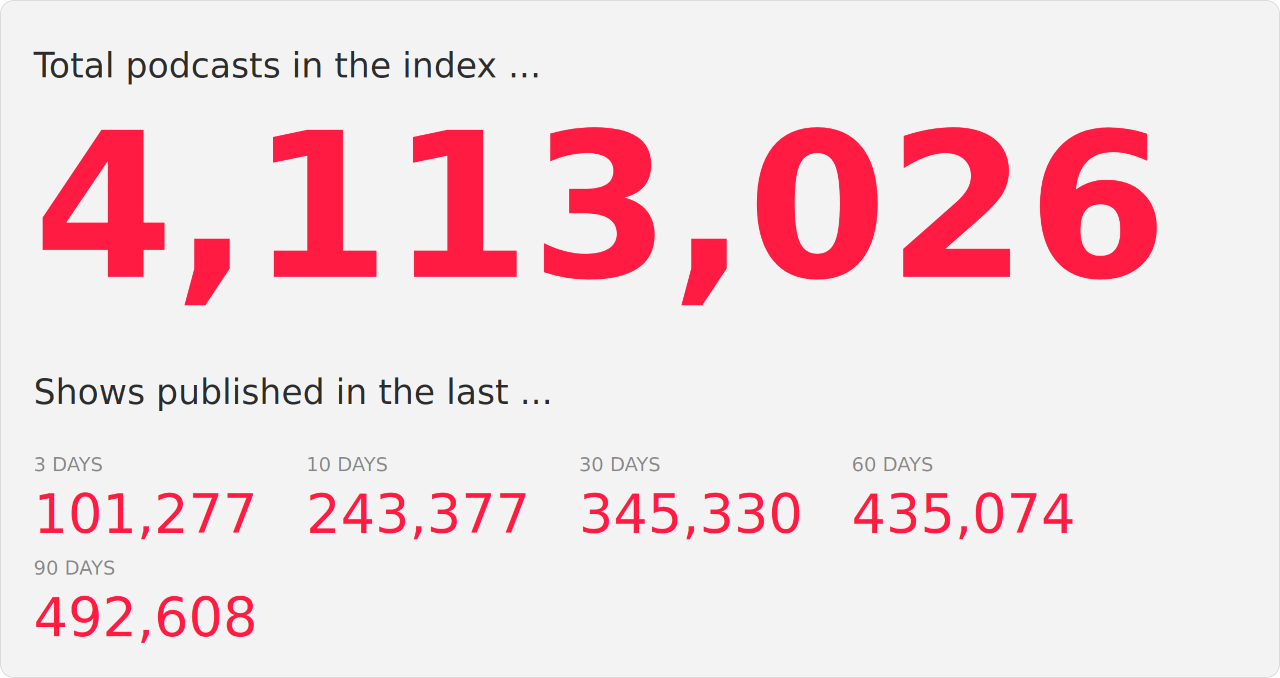
BB: How many entities have joined the movement?
DJ: There are over 400,000 podcasts that declare the Podcasting 2.0 namespace in their RSS feed. We will probably be at half a million podcasts by early 2023. And there are almost 60 different apps and services, including Castopod, that are Podcasting 2.0 feature compliant, and that deliver some of these features to their customers.
Podcasting 2.0 is backwards compatible.
BB: What are you most proud of?
DJ: Um… I guess what I'm the most proud of is just the people within the Podcasting 2.0 open-source movement. Benjamin, you've been involved since very early on, you know how it is the people themselves. I don't run the Podcasting 2.0, it's people who run it. There is no leader of Podcasting 2.0. I've been involved in three different open-source projects in my life. And this one is truly a group. There is nobody who runs it. Usually there is a sort of benevolent dictator who's in charge, and who has to approve everything getting done. That's really not the case with Podcasting 2.0. Everybody does their own thing. And I think it's a testimony to the decentralized nature of podcasting itself. Because podcasting really is just a collection of apps, services, and hosts. If one of them chooses to do a certain thing, they just do it. Nobody has to approve anybody's stuff. So I think this group, this community that has come together and that does something cool every single day, is the thing I'm the most proud of.
AC: One thing is important to say, it’s that Podcasting 2.0 is backwards compatible. Podcasting 2.0 is podcasting. Podcasting 2.0 is probably the worst name that we could have come up with, because you can't make a domain name out of it. It's hard to search… But it truly is Podcasting 2.0 that I’m proud of. I’m very proud of the fact that we have captured the spark once again. We captured lightning in a bottle, as we say in America. I have run a $400 million company with 700 employees, I have run smaller companies, I went on a lot of different business ventures after MTV. And the group that came together for Podcasting 2.0 is hands down the most exciting. A group of experts that you could not put together. If you had a hundred million dollars a year, you could not get these people to even want to be a part of something. They have to want to be a part of it themselves. Also, we implemented micropayments. They have always been promised by technology, and you would always hear that your refrigerator was going to know when you were out of milk and was going to order it for you. I’m still waiting for that to happen. And it was always going to be micropayments. We actually implemented them, we actually created something where everybody who's participating in the process could get a micropayment out of it. We're not ever going to be recognized for it and that's okay, but we did it. Not just Dave and Adam, but the whole group did it. That's incredible. I'm really, really proud that we have put that together.
Cross-app comments allow you to comment about a podcast in one app and see that comment in another app.
BB: Is there a roadmap for 2023?
DJ: I would say cross-app comments. Cross-app comments allow you to comment about a podcast in one app and see that comment in another app, then to reply to that comment in the other app and see it in the first app. All apps are seeing and replying to the same group of comments. So, those comments are not siloed within one app.
AC: That way, the content creator can still “own their audience”. It’s not captured by Google, Discus, Twitter, or anything like that. That's our philosophy. We don't really have a roadmap, we just have to stay on the road and make sure we don't go off the cliff, as long as we keep bringing more people in. Hosting companies are key, and Dave maintains the best relationships with them. Very much like Castopod, which is a big driver of cross-app comments. I'm very excited to see what kind of creativity comes out of all that. How do people use chapters? How do people use geolocation tags?
DJ: It took a while to dawn on me that the podcast industry itself did not have a great relationship with open-source. With open-source, everybody's going to see all your source code and everybody's going to know exactly what you're doing. No secrets. That's not something that the podcast industry was familiar with. They don't work that way. You can't see my stats and I can’t see yours… I've got this secret way I do things and I'm not going to tell you about it because that could threaten my cash flow. So when we started this, it took a long time for this idea to be fully embraced. I think that a spin off of Podcasting 2.0 is that we've brought back a level of comfort with open-source to the podcast industry, where it should have been all along because RSS was born in the open source world. And I think that it's going to continue into this year.
If you’re a listener, try a Podcasting 2.0 app.
BB: How could someone join the movement?
DJ: If you're a developer, go to podcastindex.org, get some API keys and start testing the API. Join the discussion on the podcastindex.social Mastodon instance.
AC: You can start following us on Mastodon @dave@podcastindex.social and @adam@podcastindex.social. If you’re a listener, try a Podcasting 2.0 app. Go to NewPodcastApps.com. All of the podcasts that you listen to now will work in a Podcasting 2.0 app. If you’re a podcaster, you will find on there which hosting companies support which features. And if you come up with a new idea, let us know!
DJ: And listen to our show “Podcasting 2.0” every Friday at 12:30 PM CST.
Photo: © Jeremy Poley

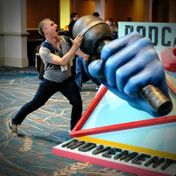
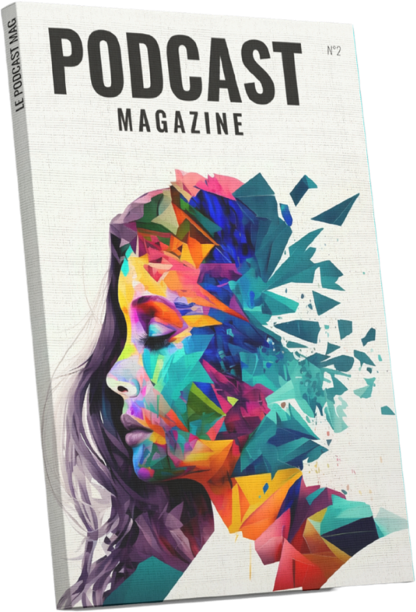 🇫🇷 Cet entretien est disponible en Français dans le numéro 2 de
🇫🇷 Cet entretien est disponible en Français dans le numéro 2 de 